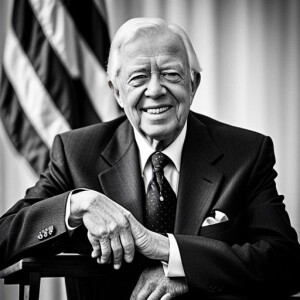
Jimmy Carter, the 39th President of the United States, is a remarkable individual whose life and work have left an indelible mark on history. Born on October 1, 1924, in Plains, Georgia, Carter spent his early years on a farm and learned the value of hard work from a young age. After graduating from the United States Naval Academy, he served in the Navy before returning to take over his family’s business.
Carter’s political career began in 1962 when he was elected to the Georgia State Senate. From there, he went on to serve as Governor of Georgia from 1971 to 1975 before being elected President in 1976. During his presidency, he accomplished many significant achievements, including the signing of the Camp David Accords between Israel and Egypt and the establishment of diplomatic relations with China. He was also a strong advocate for human rights and environmental protection, creating the Department of Energy and the Department of Education.
Despite his successes, Carter’s presidency was also marked by economic struggles, high inflation rates, and the Iran hostage crisis. However, he remained committed to his ideals and continued to work tirelessly for the betterment of society.
After leaving office, Carter founded the Carter Center, a non-profit organization dedicated to promoting democracy and human rights worldwide. The center has had a significant impact on various initiatives, from monitoring elections to eradicating diseases to promoting peace in conflict-ridden areas. Carter has also served as a mediator in conflicts in Haiti, North Korea, and other countries.
Carter’s humanitarian work has earned him numerous awards and accolades, including the Nobel Peace Prize in 2002. He has authored several books on topics ranging from politics to religion to history, and his legacy as a statesman and humanitarian is widely recognized. His life is an inspiration to many, and his commitment to making the world a better place serves as a reminder of the power of one person to effect positive change.
